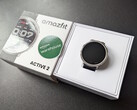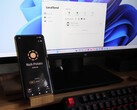After my old Amazfit Bip Lite became too shabby to wear in public, it was time for something new. A round design, long battery life, and alarms I can set right on the watch — that’s all I really need. But most current models, even from Amazfit, start at around €100 (the Amazfit Active 2 is down to $80 on Amazons Black Friday). I was hoping for something closer to €50 — after all, my watch doesn’t have to be capable of much. As I wrote in a recent opinion piece: smartwatches are often “overpriced, overstuffed, and intrusive!”
Since the established brands don’t currently offer anything truly budget-friendly (as mentioned — the options basically start at €100), I took a look on Aliexpress. Eventually I gave in and ordered the “LLIGE Bluetooth Call Women Smart Watch Men Sport Fitness Watches Heart Rate Health Monitor Smartwatch for Android iOS”: a decent-looking round screen, IP68 (not something I plan to test), and alarms directly on the touchscreen. Price: €17–25!
The only spec that seemed questionable was battery life, but I was willing to compromise — same for the not-well-reviewed Da Fit app, which I wanted to avoid using anyway. A few days later, the watch arrived.
My verdict on the watch
After several days of use, it became a mixed experience. Unfortunately, the one downside ended up being significant enough that I started looking around again — more on that another time.
The good
I was genuinely surprised by the battery life of this bargain model. On a single charge, the 230 mAh battery has been lasting about a week and a half with my minimal usage — and it’s still showing roughly half capacity. That gives me hope that other models might also last much longer than their specs suggest when used lightly. The touchscreen responsiveness was also better than expected.
The bad
If you care about privacy, this might disappoint you — many cheap smartwatches don’t have any open-source companion app alternatives. Gadgetbridge reportedly works for some models, but it didn’t detect mine. And the default app, Da Fit, isn’t great and is likely not too privacy-friendly.
Worse yet, you have to use it at least once, because there’s absolutely no way to set the time directly on the watch. A one-time sync with a smartphone is mandatory.
Up to that point, though, things were still okay. It seemed like I had found an affordable watch with decent looks, great battery life, and on-device alarms. The watch faces were very limited and mostly unimpressive, but I managed to find one I liked — it looked a bit like an electricity meter.
The ugly - the only feature I needed is bugged
And then the watch completely let me down with a basic function: the alarm. There appears to be a bug — the watch lets you set an alarm directly on the device, but instead of vibrating, it blasted a painfully loud melody at me the next morning.
In the settings, under “Vibrate & Ring,” you can theoretically choose whether the watch should vibrate, vibrate and ring, or stay muted — but the feature seems broken. No matter what I select, the watch refuses to vibrate and instead plays the extremely loud ringtone. There’s also no way to change this in the app. The feature is simply bugged. My only hope is a firmware update.
Final thoughts
I expected a €17 smartwatch to disappoint me with its battery life, appearance, or cheap build quality. Instead, it failed at a function I assumed every smartwatch could handle: a silent wrist vibration for an alarm. Maybe I was just unlucky and other models don’t have this issue.
But it does highlight the core problem with ultra-cheap Aliexpress watches and similar products: you can’t rely on them to work properly — let alone hold up long-term. As the saying goes: buy cheap, buy twice.
If any of the major brands were to offer a well-built, reliable, and reasonably priced alternative, I’d be interested. Until then, I’ll probably wait for a sale that brings an overengineered mainstream smartwatch down into my price range. To be continued...




























